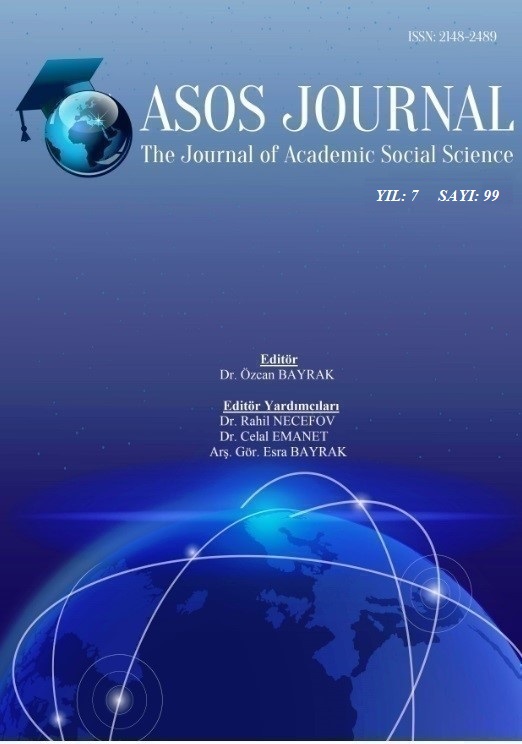Author :
Abstract
Bu makale, 2014-2018 yılları arasında Katar, Körfez İşbirliği Konseyi ülkeleri ve Mısır arasında ortaya çıkan Körfez krizi tarihsel gelişimi ile ilgilidir. Araştırmacı, Körfez Krizinin köklerinin, Suudi Arabistan Krallığı'nın Katar topraklarına doğru genişleyen hırslarında, topraklarının bir uzantısı olarak 2014 yılına kadar dayandığı sonucuna varmıştır. Araştırmacının dolaylı sebep dediği şey budur. Araştırmacılar, acil nedenlerle ilgili olarak Katar’ın Müslüman Kardeşler ’deki konumunu, “Körfez İşbirliği Konseyi’nin devletleriyle Mısır’ı , Katarı temsil edilen “Cezire Kanalının pozisyonu” olarak özetlemektedir. Ayrıca, Körfez İşbirliği Konseyi ülkeleri ve Mısır, Katar Devletinin Türkiye ve İran'a yaklaşmasından korkmasıdır. Makale, birinci ve ikinci Riyad Konferansı ve çıktılarını tartışmaktadır. Makale, 2017'deki krizin yoğunlaşmasına, ablukanın Katar Devletine uygulanmasına ve 2018 konsoloslar geri çekilmesini tartışmaya değinmektedir. Makale, Arap-Asya, Avrupa, Afrika ve Amerika düzeylerinde Körfez-Katar krizinden uluslararası durumunu açıklamaktadır. Özellikle, makale, Avrupa Birliği ve Amerika'nın terörle mücadelenin savunucuları olma konumuna odaklanmaktadır. Son olarak, araştırmacı bu yazıda hem Katar hem de Körfez İşbirliği Konseyi ülkeleri için yerel ve küresel düzeyde Körfez krizinden kaynaklanan siyasi ve ekonomik yönden ortaya çıkan en önemli sonuçları açıklamaya çalışmaktadır.
Keywords
Abstract
This article deals with the historical development of the Gulf crisis between Qatar, Gulf Cooperation Council countries and Egypt between 2014-2018. The researcher concluded that the roots of the Gulf Crisis were based until 2014 as an extension of the territory of the Kingdom of Saudi Arabia in its expanding ambitions towards Qatar. This is what the researcher calls indirect reason. For urgent reasons, the researchers summarize Qatar's position in the Muslim Brotherhood as the “position of the Jazeera Channel end repre-sented by the Gulf Cooperation Council states and Egypt, Qatar. Besides, the Gulf Coop-eration Council countries and Egypt is afraid of approaching the State of Qatar, Turkey, and Iran. The article discusses the first and second Riyadh Conference and its outcomes. The article focuses on the intensification of the crisis in 2017, the application of the blockade to the State of Qatar and the discussion of the withdrawal of consuls in 2018. The article describes the in-ternational situation from the Gulf-Qatar crisis at the Arab-Asian, European, African and American levels. In particular, the article focuses on the position of the European Union and America as defenders of the fight against terro-rism. Finally, in this paper, the researcher tries to explain the most important political and eco-nomic consequences of the Gulf crisis at the local and global levels for both Qatar and the Gulf Cooperation Council countries.
Keywords
- Alarabiya. "", Temmuz 2017, Pazartesi. [Online]. Mevcut ,. Varış tarihi Çarşamba Şubat 2018. Temmuz 2017. http://www.alarabiya.net (erişildi: Şubat 2018).
- AlarabiyaTV. Körfez Devletleri ile Katar Gizli anlaşması’nın belgeleri. GY Temmuz 2017. http://www. alarabiya.net.
- Alguds. Katar "İnsan Hakları Muharebesi" ve Abluka Devletlerinin Faillerini Aşmak için Yıkıcı Olduğunu. 30 Eylül 2017. http://www.alquds.co.uk (erişildi: Mart 28, 2018).
- Al-Jbeir, Adel. İran, bölge ve dünya için tek ve en tehlikelidir. 23 şUBAT 2018. https://twiter.com/KSAMOFA (erişildi: mART 4, 2018).
- Al-Jubeir, Adel. İran bögeye ve Dünyaya karşı tek tehdit. 23 Şubat 2018. https://twiter.com (erişildi: Mart 4, 2018).
- Alkhtib, Maher. katar ile Suudi Çatışmalarındaki Gizli Sebep nedir. 26 Mayıs 2017. www.alalam.ir/news (erişildi: Mart 20, 2018).
- Badawi, Ibrahim. Türk - Katar İlişkileri Kuşatmadan Sonra Güçlendirild. 31 Ekim 2017. http://www.raya.com (erişildi: Mart 29, 2018).
- Cnn. Katar, KİK ülkeleri Doha ile diplomatik ilişkileri kestikten sonra ekonomik kriz ile karşı karşıyadır. 6 Haziran 2017. https: //arabic.cnn.com (erişildi: Mart 28, 2018).
- El ArabiyaTV. «Riyad Ek Anlaşmasının Gizli Belgesi.» El Arabiya. TEmmuz 2017. http://www.alarabiya.net (erişildi: Şubat 23, 2018).
- Elqahtany, Abdelgadir Mahmud, (2008), Körfez Modern Tarihi., almerkez alkavmi lisakafa ve alturas. Doha.
- Gümüşlüoğlu, Feyza,(2017) , "Katar Krizi: Terör Listesinde Kim Kimdir" Ortadoğu analiz- Katar Krizi, ORSAM, Ankara, S. 9-11.
- Hamdıya, Mohammed Abu. «Rusya ve Türkiye - siyaseti gölgeleyen bir.» RT.Arabic. 9 Ağustos 2016. https://www.youtube.com (erişildi: Mart 2, 2018).
- Hassan, Islam Khalid. «Körfez-Körfez Farklılıkları:Çözümün Nedenleri,Sorunları ve Mekanizmaları,.» Al Jazeera Araştırma Merkezi. 15 Ocak 2015. http://studies.aljazeera.net /ar/files/gccpath.
- Kabbani, Nader. Körfez Krizinin Yüksek Gerilim ve Ekonomik Etkisi. 15 Temmuz 2017. https://www.brookings.edu/blog/markaz.
- Katar ile Diplomatik kriz. 18 Mayıs 2017. https://www. wikiwand. com.
- Khammash, Nadin. «KİK Ülkeleri ile Katar Anlaşması Belgeleri 2013-2014.» ALARABIYA NET. 10 Temmuz 2017. http://ara.tv/zf9n (erişildi: Mart 1, 2018).
- Orkaçı, Serhat, (2017) , "Katar Krizi’nin Afrika’daki Yaysımaları" Ortadoğu analiz , Orsam, Ankara, S. 22-23.
- RT. «Katar ve Boykot Devletleri ortak bildirisi’nin tam Metini.» RT Arap kanalı. 5 Mayıs 2017. https://arabic.rt.com (erişildi: Şubat 20, 2018).
- Tashağatai ve Erdoğan, Gulshan ve Hussein. «Ankara’da Katar Büyükelçisi(Türkiye'ye sıvılaştırılmış gazın aktarımı için sürekli hazırlığımız).» Anadolu Ajans. 25 Mart 2016. http://ara.tv/zf9nq (erişildi: Mart 2, 2018).
- TurkyPost. Türkiye'nin Doha büyükelçisi Katar'ın başarısız darbe girişimi. 13 Temmuz 2017. https://www.turkey-post.net . (erişildi: Mart 29, 2018).
- Wikipedia. 2017-2018 yılında Katar kirizi. GY AY TY. https://www.wikipedia.com (erişildi: Şubat 20, 2018).
- Wikiwand. Körfezdeki büyükelçilerin çekilmesinin krizi. 1 Mart 2018. http://www.wikiwand.com.
- Yıldırım, Receb, (2017) , Golon örgütü ve darbe teşebbüsü, İstanbul: Turkuvaz Haberleşme ve Yayıncılık.
- Yılmaz, Duhan Can.,(2019), "Katar Diplomatik Krizi’nin Ekonomi Bağlamında Değerlendirilmesi" , Uluslararası kriz ve Siyaset Araştırmaları Dergisi, S. 109-131.
- Yusuf, Mohammed. «2013 Riyad anlaşmasısının şartları ve Katar taahuhutütleri.» Almrsal. 12 Temmuz 2017. https://www. almrsal. com.
